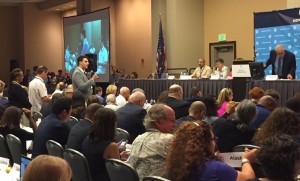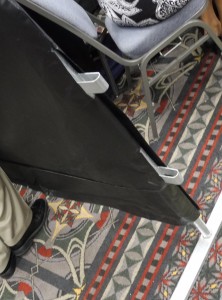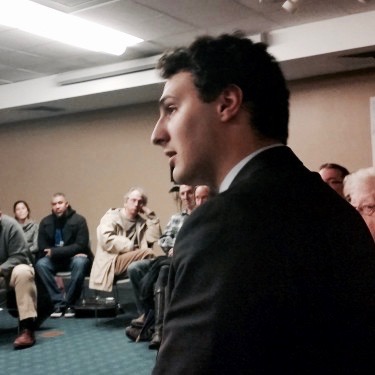
It was, at times, a tense afternoon on the opening day of the Democratic National Convention in Philadelphia as the party publicly questioned its superdelegate process.
Rhode Island Rep. Aaron Regunberg had the honor of introducing the first amendment to the Rules Committee meeting that would have eliminated superdelegates outright. It won 58 votes, not enough to pass but enough to keep the conversation alive.
Neither side ended up with everything they wanted, but by nightfall a compromise that seemed acceptable to the vast majority had been hammered out.
Sanders and Clinton delegates eventually agreed to create a “Unity Reform Commission” – it passed 158 to 6, with 2 abstentions. The commission is tasked with returning recommendations on reforming both the caucus and superdelegate process, specifically calling for a 2/3 reduction in the number of superdelegates. It would be a commission with teeth, charged with finding the best way to keep the elected superdelegates but explore mechanisms for keeping them from weighing in on the primary process too early.
Given lopsided vote totals earlier in the day, this marked a clear coming together of the two factions in the room. There was significant applause, cheering, and a sense in the room that progress had been made.
Regunberg was optimistic, calling it “a compromise made significantly better by the pressure exerted at the grassroots.” He admitted that the language of a “commission” could sound off putting, but he stressed that the amendment specified end products as well as process. “What we passed instructs the commission on what it will be recommending.”
There were moments of drama even before the DNC Rules Committee got fully underway this afternoon at the Democratic National Convention as more than 100 would-be spectators chanted “open the doors” in the hallway outside room 120 of the Pennsylvania Convention Center.
The space, which had room for approximately 200 delegates and about another 160 or so press and other attendees behind crowd control barriers running down the back third of the room (which were tastefully draped in black vinyl) had run out of seats, and Philadelphia police swept the space outside the room, moving reporters to the end of the hall.
After about 20 minutes, DNC staff began letting the press in by ones and twos. Some of the would-be attendees had been admitted, but there was still a line stretching back toward the front atrium of the convention center, and the folks in that line were not happy with the situation. While the Rules Committee took care of some housekeeping items — adopting the rules for the meeting, voting for the officers of the Convention (which included RI Gov. Gina Raimondo as a co-chair) — chair Barney Frank had to fight at times to be heard over the chants of “open the doors” from outside.
Once the preliminaries were out of the way, the Committee took up a series of amendments to modify the superdelegate system – which, as we’ve all become aware in this cycle, creates a class of party leaders and elected officials who are automatically delegates and who are not bound to vote for a particular candidate.
“I’m a Democrat because I believe in democracy,” said Regunberg, when he introduced the motion. “I believe in the promise of one person, one vote, that so many of our fellow Democrats have struggled and bled for. There is currently absolutely no rule keeping superdelegates in future cycles from overturning the will of the people. Creating a perception for many of our voters that the system can be rigged.”
The motion was debated for 16 minutes, and failed, 108 to 58. The good news for Regunberg’s amendment is that he had 54 delegates who signed on, enough for a “minority report” that will bring it up for discussion on the convention floor.
A second motion that would have reduced the power of superdelegates failed 107-57. A third motion to reduce the number of superdelegates failed 111-61. A fourth, which would have kept superdelegates but given them no voice in the first ballot failed 106-60 A final motion, which would have created a new class of superdelegates bound to the popular vote failed 110-60.

As each vote was taking place, activists in the back of the room shouted encouragement – and the occasional warning like “Don’t split the party!” A succession of speakers in support of each motion implored their fellow delegates, with one noting that the American people were watching – “On TV and even out in the hall.” The numbers on each side of the issue stayed remarkably stable.
After about two hours of discussion and voting on the sequence of the amendments, the committee recessed. And it was a long recess — long enough that the DNC relented and opened the bar in the lobby for the thirsty press corps — with several of the delegates involved in the superdelegate fight seen disappearing into a smaller conference room across the hall. More than an hour later, the committee — while still in recess — asked all the Sanders delegates to huddle in another room. The buzz in the room was that there were some high-level negotiations going on, and when they returned it was with a substitute amendment.
In a genuine show of unity, no one spoke against the amendment, and the chair even dispensed with the rules to allow Clinton supporters another 8 minutes of supporting speeches. Typical was that of Newton, MA mayor Setti Warren, who said, “What we’ve done this evening will make our Party proud and our country proud.”


